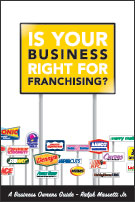|
Call Us Today
5551231234 |
||
|
Contact Us by Email |
||
| Request More Information |

Buy a copy of our CEO's book "Is Your Business Right For Franchising?" on Amazon today.
International Franchise Association (IFA)
Supplier Forum Member

How do I turn my brand into a franchise?
(The Sunday Times) November 13, 2005 -- By Sandra O’Connell
WATCHING a business grow rapidly into a recognised brand is every entrepreneur’s dream. Franchising is a popular route to turning that vision into reality. That’s what three former IT entrepreneurs did with the wine shop they launched in Limerick five years ago.
Having sold their previous venture, a technology firm, to an American multinational in the late 1990s, Michael McDonnell, Paddy O’Flynn and Darragh Moore decided to do something completely different. They opened their Wine Buff store on Mallow Street in Limerick just before Christmas 2000.
The aim was to concentrate on wines from small family-owned vineyards, primarily in France, where O’Flynn now lives and sources stock.
The success of the store led the trio to think about expansion. Rather than opening more shops themselves, they decided to bring in franchisees. Today there are seven Wine Buffs around the country, and scope for many more. The aim now is to have 40 franchised stores throughout Ireland before moving on to Britain and France.
“We opted to franchise because we had spent 2Å years building (the brand) up and had reached a stage where we were ready to expand,” said McDonnell. “This meant either opening shops ourselves or taking on franchisees. The main advantage of franchising is that it allows you to expand faster.”
There is another advantage that is just as important. “Our concept depends entirely on good customer service, the kind you used to get in Ireland 15 years ago,” he said.
“We’re not interested in having someone pop in for a bottle and then disappearing. We want them to stay a while and develop a relationship.”
He believes hired help is less likely to achieve this. “Because of staff turnover, the emphasis on customer service is harder to maintain if we were simply opening shops and staffing them with managers,” said McDonnell. “With a franchisee you get their passion to succeed. Nobody opens a franchise to fail, they all want to succeed and the overall business will benefit from that.”
Certainly there seems to be no shortage of franchisees willing to bank on the model’s success. A new store opens in Sligo this week, one in Newbridge next week and one in Waterford before Christmas.
Last year, the trio sold its Limerick shop to concentrate on building the brand. The trio receives €75,000 upfront from each franchisee, for which they provide a turnkey package including operating manual, training, shop fit-out and stock. They also receive a royalty fee of 5% of turnover annually from each store.
Interest in franchises has grown in the past decade. Total franchise turnover in Ireland in 2003 stood at €1.27 billion, excluding sales by retail symbol groups, according to a 2004 report. In 1995, that figure was just €250m. In the same period, employment in the franchise sector rose from 4,900 to almost 18,000. The Bank of Ireland estimates turnover in the sector is now €2 billion.
It has set up a €100m franchise fund to help businesses expand and new entrants to get started. This will involve consultations, discounts on products and services and membership of small business associations. New business clients need not pay fees for two years and will be offered special rates on loans.
The figures are encouraging, but small firms should not jump in too quickly, as only certain types of businesses are suitable for franchising, the experts say. “For a start, you have to have a profitable track record,” said Margaret Nolan, business manager at Bank of Ireland’s franchise unit. “The business has to be successful in the first place.”
It must have a clear identity too, or what Nolan calls “the look and feel of it, or the ‘trade dress’.” Steps must also have been taken to protect or trademark the business name.
Then there is the question of preparing a package to supply to franchisees. “You need to have the management systems in place that will allow you to put together an operating manual showing the processes clearly from step one to step 100,” said Nolan.
The foundation of the franchise agreement is a legal contract that must be drawn up by a law firm that specialises in such matters. “Having the right legal contract in place is very important if you are not to lose control of your business,” said Nolan. “Certainly, never be tempted to take on the wrong franchisee just because of the prospect of €40,000 upfront. The reputation of your business is at stake, so it’s important to get the right people.”
Building a franchise is very different from running your existing business, says Sean McGarry, founder of Franchise Direct, a worldwide promotion agency. “You need to know you have the capacity to do it,” he said. “What you must consider also is whether or not you have the management capability to be able to assess and develop out the franchise.”
He too warns those who are tempted by the money to tread carefully. “Franchising is a business that requires scale,” said McGarry. “If you have a coffee shop and you want to open another two, then it’s pointless franchising. You’d be better opening them yourself,” he said. “This is because what you are really doing is sharing the profits with the individuals locally, so you need to go for scale rapidly to make it pay.”
The prospective franchisor also has to factor in upfront costs such as promotion — each commits to a certain annual spend advertising the business — and legal fees.
For those who are ready, there is a “good flow of people” looking to invest in franchises right now, he says.
Despite the particular success of food franchises, it is a route Itsabagel founder Domini Kemp has ruled out. Set up in 1999, the company has four Dublin outlets and an outdoor catering unit. Recently it invested in a centralised kitchen and two new stores are planned for outside Dublin next year. Kemp and her sister and partner, Peaches, will retain ownership of all elements.
“Our concern is that if we franchised, quality would slip,” said Kemp. “The problem is that franchisees often just want to run a business — it could just as easily be a print or footwear franchise. For us that means they couldn’t offer the level of care we do.”
Business owners need to have high standards when it comes to taking on franchisees, said John Green, the chairman of the Irish Franchising Association. Green introduced the ChemDry franchise to Ireland in 1989 and now has 40 up and running. He is recruiting more, with a view to having 60 of the carpet and upholstery cleaning franchisees throughout the country.
Each new franchisee pays €35,595 plus Vat and, thereafter, a flat monthly fee of €427 in royalty payments. For this they are equipped with ChemDry product, livery and allocated a population region of 60,000 people.
“It’s vital to get the right calibre person on board, because the company is literally only as strong as its weakest link in the franchise chain,” said Green.
His own franchisees are a typical mix, including a former bank official, a petrol station manager and a department store buyer. “What appeals to them about franchising is that it’s about being in business for themselves, but not by themselves. That’s the key.”
The best way to assess potential franchisees is to talk to them, he says. “You need to weed out the ones who are just looking to buy a job,” he said.
“You don’t want the person who is looking for a nine to five and thinks a franchise is the easy option. What you want is the person who, like you, wants to build a business.”

